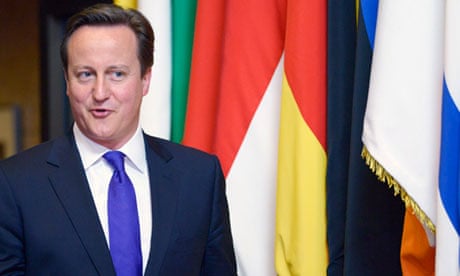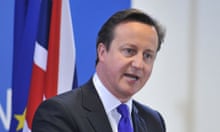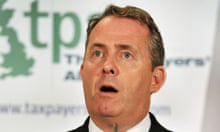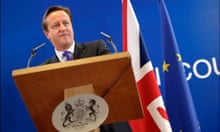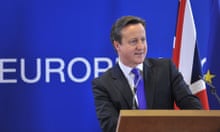The public will eventually be offered a vote on whether Britain should leave the European Union, David Cameron said on Monday as he attempted to clarify the government's thinking on an EU referendum after days of confusing signals from Downing Street.
As a ministerial aide challenged the prime minister to speed up plans for a referendum, Cameron confirmed that voters will get a chance to say whether they would like to leave the EU.
On Friday, after last week's European summit in Brussels, he rejected an immediate in/out referendum. But he did open the door to a slightly different referendum if the EU approves new governance arrangements for the eurozone.
Amid concerns in Downing Street over the weekend that his remarks were wrongly interpreted as an outright rejection of a referendum, Cameron wrote in the Sunday Telegraph that "the two words 'Europe' and 'referendum' can go together" and held out the prospect of a vote to approve a changed relationship with the EU in the next few years. The prime minister believes he will be able to table demands, such as the repatriation of social and employment laws, in return for signing an EU-wide treaty on new governance arrangements for the eurozone.
Cameron's article appeared alongside one by Liam Fox in which the former defence secretary called for immediate negotiations to rebalance Britain's relationship with the EU. If the EU rejects the negotiations, an immediate referendum, with the government recommending a no vote, should be held. Fox said that "life outside the EU holds no terror" for him.
Amid Tory back bench fears that he was trying to avoid a vote on leaving the EU, Cameron said on Monday that the option would be offered. His remarks came after Julian Lewis, a former shadow defence minister, asked the prime minister: "Is it your position that on any referendum on Europe, while you are prime minister, the option of voting to leave the EU will not appear on the ballot paper?"
Cameron replied: "That is not what I've said. What I've said is I don't support an immediate in/out referendum. I believe we should show strategic and tactical patience in this and then what I want to see is a fresh settlement that we seek fresh consent for. The right time to determine questions about referendums and the rest of it is after we have that fresh settlement. That is what we should do."The prime minister's remarks indicate that voters will be given a choice of approving a newly negotiated settlement with the EU or deciding to withdraw. Aides denied that he was signalling another change of tack. They said that it was not possible to be specific because nobody knows the speed of negotiations with the EU. Angela Merkel has signalled in private that she is open to some British demands. But François Hollande, the French president, may be less forthcoming.
Conor Burns, parliamentary private secretary to the Northern Ireland secretary, challenged him to speed up the referendum process. Burns, who is one of five PPSs to write to Cameron on the issue, told him: "The prime minister will be aware that the British public are heartily sick of broken promises on European referendums, not least because of the decision of the party opposite to renege on a referendum on the Lisbon treaty. Can [he] see the attraction of passing into law in this parliament a binding commitment to a referendum in the following parliament? And that may well strengthen his negotiating hand if he is able to look his fellow heads of government in the eye and know that any deal he negotiates will have to be put to the British people."
Cameron said he took Burns's point seriously and that the government had changed the law to introduce a "referendum lock" which is triggered if powers are passed from Britain to the EU. But he rejected the MP's proposal on the grounds that it was necessary to show patience as developments move at a rapid pace in the EU.
Ed Miliband mocked the prime minister for a "weekend Hokey Cokey". "On Friday he ruled out a referendum. Hours later 100 backbenchers call for an in/out referendum. Then, hey presto, on Sunday the prime minister hints he might rule one in. Then the foreign secretary said the prime minister is not changing our position. But three days, three positions. First it was no, then it was yes and then it was maybe."
